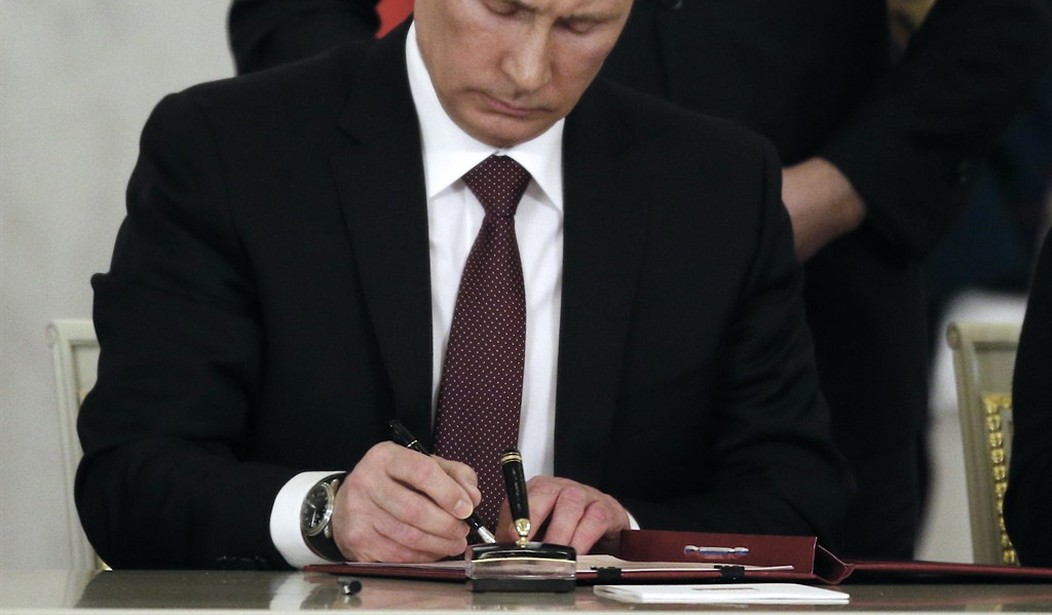Bungling is an inherent feature of American foreign policy. Even with the best of intentions, our presidents miss warning signs, overreact to minor threats, fail to dissuade other governments from doing things we oppose and wade into situations that blow up in our faces.
It's not a Republican or Democratic thing. In trying to shape events in a big, turbulent world of competing nations, failure is just more common than success. In his novel "American Pastoral," Philip Roth writes, "That's how we know we're alive: We're wrong." That's also how you know you're president.
George H.W. Bush inadvertently gave Saddam Hussein a green light to invade Kuwait in 1990. Bill Clinton's careless extension of our intervention in Somalia led to the Mogadishu debacle. George W. Bush made a horrific mess of the Iraq occupation. Barack Obama threatened Syria with air strikes only to back down.
When our presidents take action, we are fully aware they may not know what they're doing. But when foreign leaders take action, we assume they are brilliant strategists who never set a foot wrong.
So Vladimir Putin's invasion of Crimea is taken to reflect his cunning sense of American weakness and his shrewd eye for geopolitical advantage. House Intelligence Committee Chairman Mike Rogers, R-Mich., claimed, "Putin is playing chess, and I think we are playing marbles."
But if Putin were a foreign policy grandmaster, he wouldn't have pushed Ukrainians so far that they toppled the government he was propping up. He would have devised a way to secure Russian interests in Crimea without using force and exposing himself as a goon.
This alleged stroke of genius was guaranteed to alienate his neighbors and most of the world -- and even discomfit the Chinese government, which he covets as an ally. Putin is making the best of a bad situation that he did much to create.
Recommended
Sunday's referendum went as the Russian president hoped. But he may have taken a bite too big to swallow. Crimea is no gold mine. Poor, undeveloped and rife with organized crime, it was a drain on Ukraine and will be a drain on Russia.
In trying to control Ukraine, he turned it into a bitter enemy. If ethnic Russians in the eastern part of the country rebel against the Kiev government, he may feel compelled to take military action there as well, leading to war with Ukraine.
He could find himself occupying a region with many citizens who detest him, some of whom will learn how to build IEDs. He could see Ukraine fall into violent chaos that infects Russia.
Too bad the Soviet leaders of 1979 aren't around to tell him about their invasion of Afghanistan, undertaken to rescue an ally. By the time the Soviets left in 1989, they had lost more than 14,000 lives as well as the war. An invasion that the West saw as a terrible setback helped precipitate the collapse of the Soviet Union.
The men in the Politburo were groping in the dark -- just as American presidents often do and just as Putin is doing. Our enemies, it's easy to forget, are just as fallible, blind to risks, misled by ideology and limited in options as we are. They have no magical capacity to see the future. They face obstacles they can't overcome.
Putin opposed the expansion of NATO, to no avail. He opposed the Orange Revolution in Ukraine, which happened anyway. His country shares land borders with 14 countries, many of them hostile.
One of them, China, is a historic rival that has become an economic power, boasts the biggest army on Earth and is building a blue-water navy. Unlike his Communist predecessors, Putin has little power to influence events beyond his backyard. As shown in Ukraine, even his backyard can be unmanageable.
What he's done in Crimea won't make Russia stronger. It will cost the government large sums of money, year after year. It has sown distrust among his neighbors and around the world. It will spur his biggest natural gas customers, in Europe, to reduce their dependence on him. All that is before the impact of any economic sanctions the West may impose.
On the surface, Putin looks like the big winner in this crisis. But he may find himself in the position of the ancient Greek King Pyrrhus, who reflected on the outcome of a major battle: "One more such victory and we are lost."

























Join the conversation as a VIP Member